Raising Global Citizens is I believe the most important mission a modern parent should take on.
Raising outstanding citizens is good and remarkable... but raising aware, conscious, taped-in, empathetic, smart, strong, and confident Global Citizen is amazing. It’s glorifying, not for you the parent who does all the work, but for the world to see another leveled human being that cares about other humans and every inhabitant of the planet, animals and plants included.
I remember watching Sesame Street and seeing Jill Scott singing “We are all earthlings/Spinning around together/On a planet of the sun”. The song is a beautiful ode to all things living on earth. It uses animal and monster muppets to make the analogy that although we look different on the outside, we are all the same. We are all living creatures that share the same planet and we all belong to it. It is a Sesame Street song so it is aimed at children (and mostly parents) and I believe this song sums up pretty well what it means to be a Global Citizen.
What's a
Global citizen?
A Global Citizen, or World Citizen, is a person who acknowledges the wide and diverse perspectives of the world while still maintaining a strong sense of personal identity and personal values. They accept responsibility of the planet and its people while taking on an active role in their community to foster a more sustainable and fair society.
Embracing the Global Citizen Mindset: Thriving in a Diverse World
You might think to yourself, "well that’s a broad definition". That’s because being a Global Citizen is about embracing breadth. It encompasses being connected to the world while still being grounded and affirmed in one’s identity.
Being a Global Citizen is a mindset. It can be taught, it can be learned.
For that reason, I broke down a quick guide to give you an idea of what’s a global citizen, how to become one and why we desperately need to be one in our time.
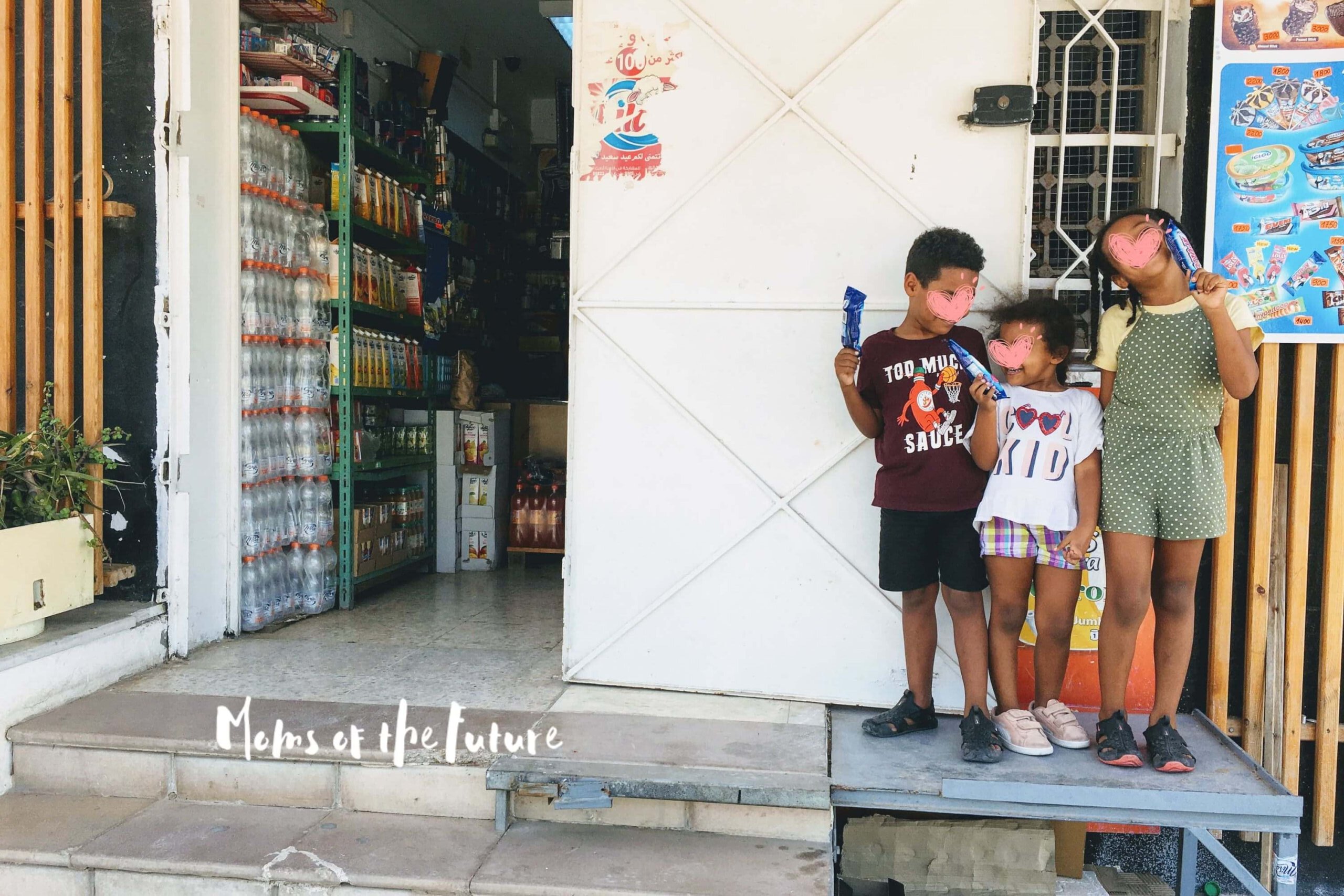
Stepping foot in foreign communities is part of acquiring the Global Citizen Mindset.
Why You Should Raise a Global Citizen
It's tempting to think that constant internet access expands children's horizons, making them more connected, open-minded, and knowledgeable. That cannot be further from the truth. Children are getting more and more pulled into polarized environments with people with nothing but opinions.
The internet is disconnecting people and children from real-life experiences. It is locking them in an infinite virtual world where they lose their identities and empathy. It is alarming when we start looking at each other as avatars, aliases, and emojis.
The world is also changing, and it's changing fast. Although we as parents can barely keep up with the new technology and the economy, our children will have to compete with A.I. and robots. Who are the leaders that will make sure to put humanity, ethics, and the global environment over greed?
For that reason, I think we parents should go a step further in making sure we raise children who are open, tolerant, and confident in who they are so they can thrive in a world that is ever-so-changing.
The mindset of the Global Citizen, empowered by a humane, empathetic, and selfless view of the world, will guide them toward creating a more sustainable and fair world.
The mindset of the Global Citizen, empowered by a humane, empathetic, and selfless view of the world, will guide them toward creating a more sustainable and fair world."
Your Values and Your Child's Individuality
In a globalized world, each Global Citizen is distinct, and shaped by unique cultures, backgrounds, beliefs, dreams, and aspirations. Children need to embrace and own their identities.
A child is born with an identity given to them by their parents. It is reflected in the name they are given, the religion they follow, the language they speak, and overall the culture they are immersed in. As the child grow, they will start to develop their personality, things they like and dislike, that sometimes challenge the very culture from which they came. A child will naturally leave the cocoon created by their parents to explore the world to "find themselves."
But the world is vast and a child can get lost.
When the child is given a set of values and principles that they can hold on to no matter where they are, what they're doing, and what they are going through, they will never be lost. It's their compass.
A Global Citizen is a grounded tree with branches that can wrap around the world. The roots are what his parents have given him. Lessons and values that cannot be bought or bent. The branches will extend with experiences, wins, and failures, but the core identity will stay solid, nurturing even the smallest leaf of uncertainty.
The tree will thrive in a vast and diverse forest.
Allowing your children to own their individuality, helps them build self-awareness, which is the ability to have an accurate and introspective perception of oneself, including one's strengths, weaknesses, values, beliefs, and emotions. Healthy self-awareness is the beginning of the Global Citizen mindset as it allows them to relate to the world around them without the need for them to sacrifice their identity, principles, and integrity.
Children need to have a system of beliefs and principles that both protects them and guides them to get the best of what life has to offer, and to thrive in a diverse world.

Taking my children to one of the oldest Mosque in North Africa allow them to connect with a part of their history.
Teaching Self-Love to Foster Empathy and Kindness Towards Others
I consider empathy to be the foundation of a Global Citizen mindset. This is the foundation for friendship and meaningful connections with people from all over the world.
Empathy is the basis for understanding and caring about others experiences, perspectives, and well-being, regardless of their cultural and social backgrounds.

The easiest way to teach a child to love and trust themselves is to shower them with love and provide for them a safe environment where they can thrive.
There is no better place for a child to learn these values of kindness, empathy, and generosity than in the home.
Showing children love and affection, encouraging them with positive words, and rewarding them for their wins are amazing ways to teach them about the power of empathy and compassion.
Acknowledging their feelings and thoughts, and emphasizing that it's okay to experience a range of emotions is part of the recipe for building strong and confident children that are ready to take on the world.
This approach not only fosters emotional intelligence but also cultivates an understanding of how diverse emotional experiences can be for people across the globe. Empathy is a major form of emotional intelligence. It helps us understand and process what people around us are feeling by translating social cues.
By simply seeing and acknowledging people's feelings and emotions, empathetic individuals participate in creating a safe space where people can feel acknowledged and valued. This is a superpower for Global Citizens because not only does it help them build strong connections with people that are based on respect and understanding, but it also nurtures compassion and care for other people's hardships and struggles.
This strong emotional connection Global Citizens build with individuals and communities inspires them to genuinely participate and assist in the betterment of the planet.
Message to the Moms of the Future:
There is no other place for a child to learn these values of kindness, empathy, and generosity other than in the home. Showing children love and affection, encouraging them with positive words, and rewarding them for their wins are amazing ways to teach them about the power of love and empathy.
Encourage Children to Be Curious
Curiosity is a major indicator of success later in life and a major element in building the Global Citizen Mindset.
Curiosity is the passport of the Global Citizen. It is the gateway of adventure and discovery that challenges our fear of the unknown. Just as we collect stamps on our passports when we travel, curiosity allows us to enjoy new experiences that expand the mind and motivate us to learn more.
Curious children get to experience things on their own, and while doing so, it helps them become independent thinkers and have their own opinions.
However, most of the time, people lose curiosity as they age. In some cases it can get diluted with biases and prejudice, closing off individuals and their children to new experiences.
Curiosity can be as simple as trying new food, asking about someone's traditional clothing or food, or attending a cultural event such as an expo or a parade.
With curiosity, children get to experience things on their own, and while doing so, it helps them become independent thinkers and have their own opinions.
Fortunately, it's never too late to be curious and learn. It's never too late to break the barriers built by our environment and move on to a more loving and open mindset toward global human connections.
The Global Citizen has a universal passport with unlimited pages waiting to be filled with exciting memories and life-changing experiences.
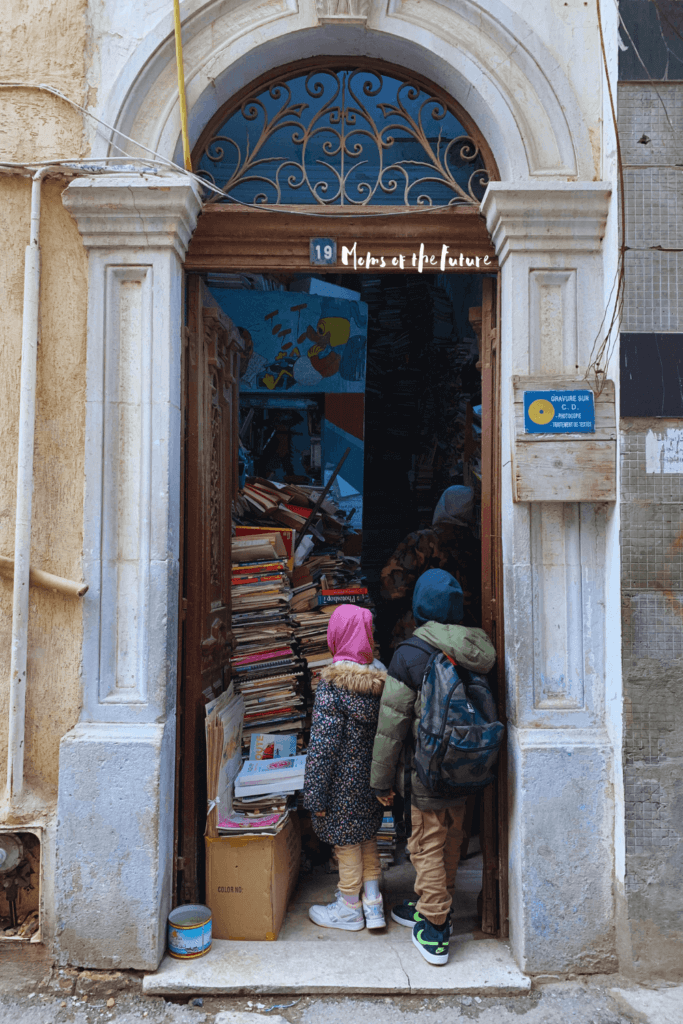
Curiosity can lead us to the most peculiar places, like this bookshop in the heart of Old Tunis.
Play is the Universal Language
Global Citizen build meaningful friendships with individuals from all walks of life, all around the world. This starts in the playground at a young age.
The playground, the libraries, summer camps are grounds for children to meet and befriend children from different background. Sometimes, I actually make the effort to initiate a game with my children and other children so they can break the ice and start to play together before removing myself.
Play is a universal language for children and the most powerful learning tool, especially when it involves children from different cultures. Even when children don't speak the same language, they can have the most fun playing intricate and complex games! It's fascinating to witness, I tell you!
Playtime also offers the opportunities to teach children the manners of Global Citizen that not only includes good manners, sharing, taking turns but also culturally sensitive manners such as not touching hair or not pulling hijabs or turbans.
When children play with children from other cultures, they get to learn so much. Not only does it open their worldview and expand their imagination but it also emotionally attach them to the parts of the world their friends are from.
Explore the World in Your Community
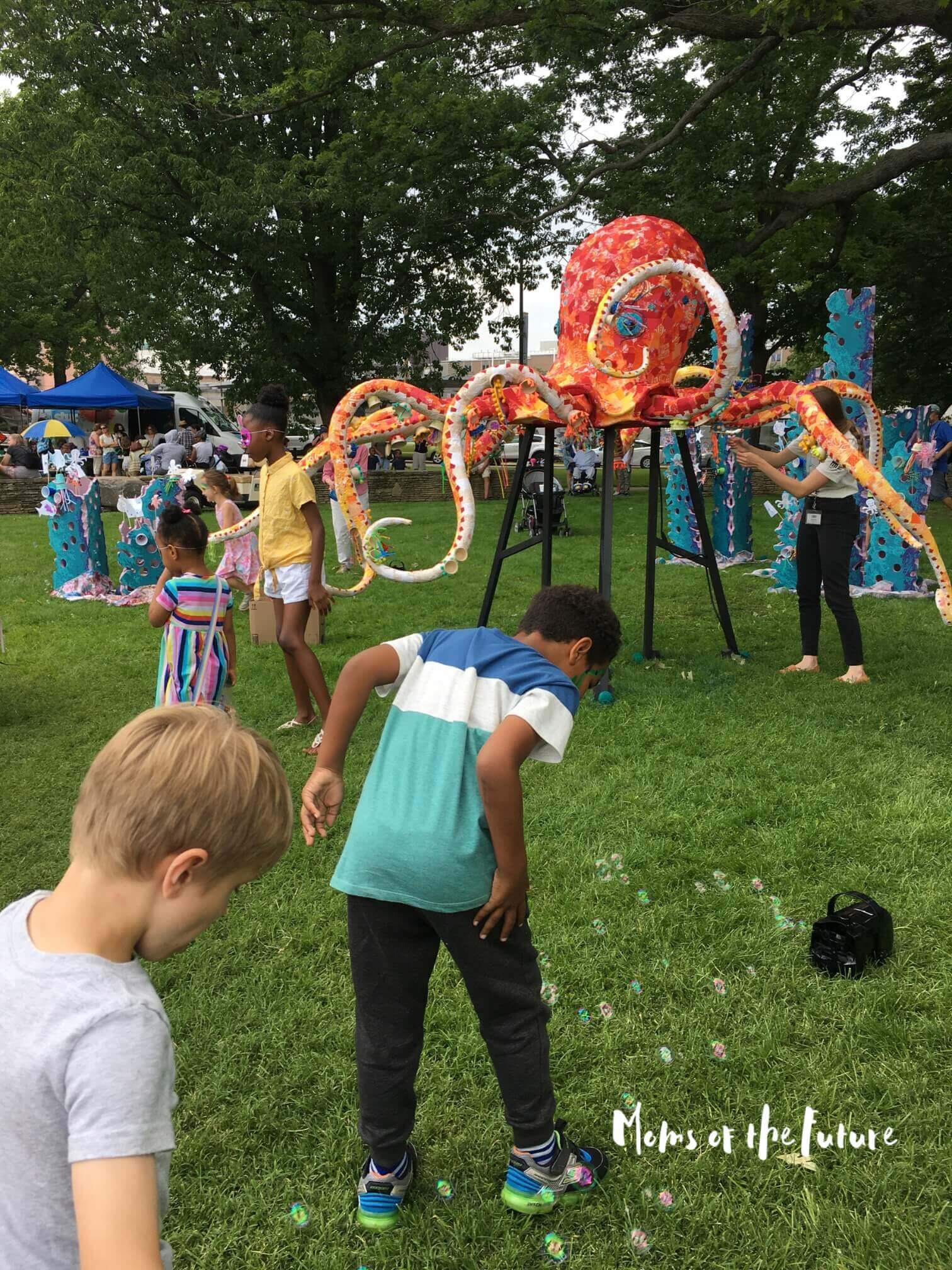
Many communities offer multi-cultural and art festivals that have the potential of opening their minds and perspectives.
The Global Citizen is first and foremost a Local Citizen.
The local community is a wonderful place to be involved and make a positive impact. As citizens we have choices in the economical, social, environmental situations of our community. Supporting local businesses and shops, buying foods grown locally while connecting with the people in the neighborhood are greats ways to have a positive impact not only locally but globally.
Neighborhoods and local communities are the connections that tie us to all parts of the world.
If we can take care of our small ecosystem, then we can transplant that same care and dedication to bigger communities globally.

Our local Eco Fest had a stand that taught children and adults about the local pollinators and how we can help create an environment so they can thrive.
Therefore, the local community offers all the tools you need to raise your child to be Global Citizen.
Explore the World With the Help of Media

The library offers plenty of relevant, updated content to broaden children minds.
I think Dr Seuss summed it up perfectly in his book "I can ready with my eyes shut" : "The more that you read, the more things you will know. The more that you learn, the more places you'll go."
Thanks to our modern world, we have access to unlimited content. Books, magazines, television, and the internet are great ways to learn about other cultures, countries, ongoing global issues, environmental and social causes. Being aware of what’s happening worldwide is a part of raising your child to be a Global Citizen.
I cannot express how fond I am of using media for learning and pushing my children to do the same. In our house, we manage to tailor our children reading and media consumption to be aligned with our specific values whilst leaving room for exploration.
If you're not doing it already I'd highly recommend you getting to know your local library very well. There is literally tons of quality content for free. Many of these resources are even online accessible with your library card which means you don't even have to take a trip to benefit.
The access of extensive literary and educational resources doesn't stop at the library. PBS offers till this day amazing content for the whole family. In my house, we love PBS kids; Sesame Street, Let’s Go Luna, Arthur, or Alma's Way (all on PBS Kids) are wonderful tools that support diversity and tolerance. There are also The Ruff Ruffman show, Mister Rogers’ Neighborhood, Sci Girls, Odd Squad and more that support learning, critical thinking and even math literacy.
For children to become Global Citizen, media can be the most effective tool to discovery and connection to the rest of the world.
Use Traveling As A Learning Tool
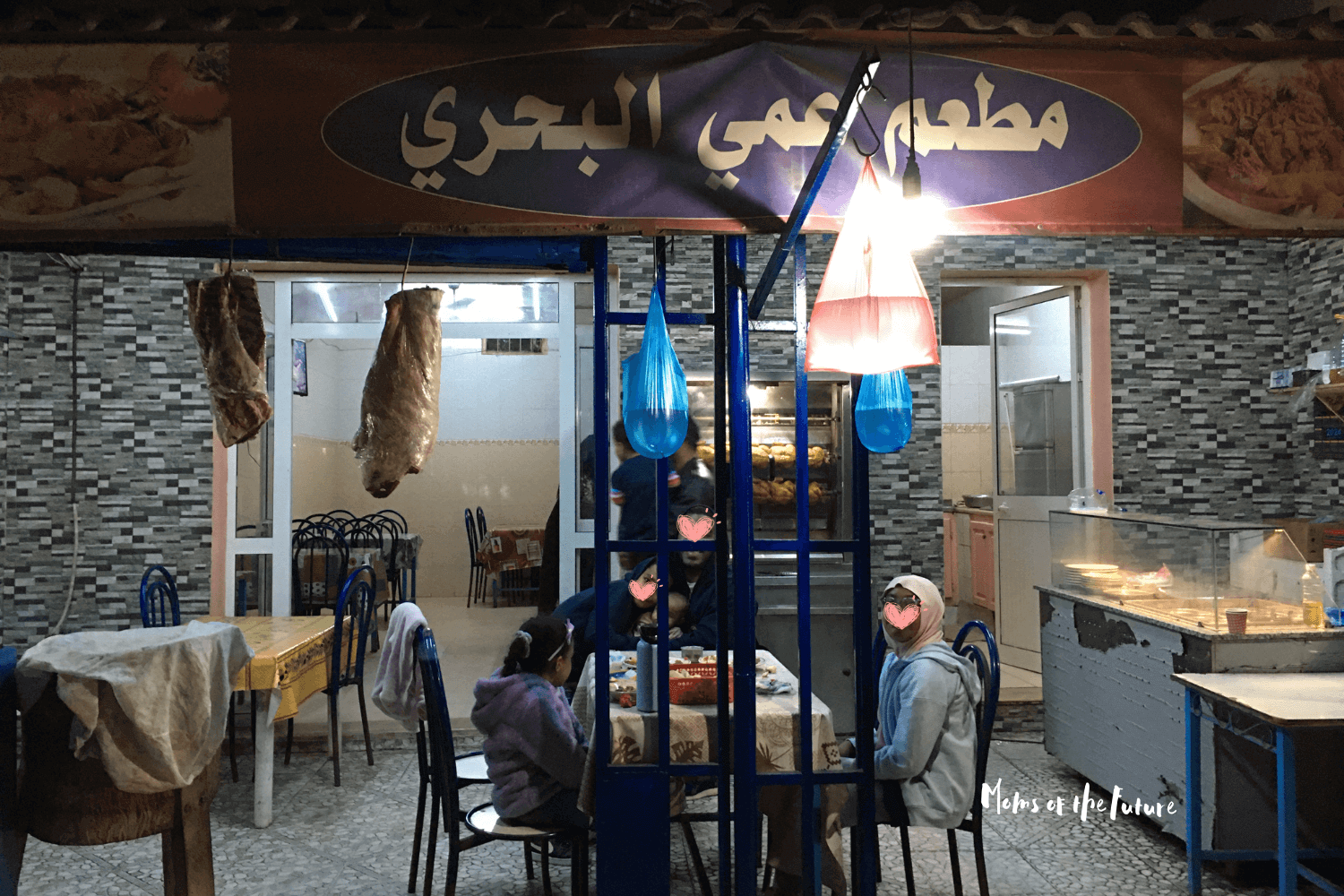
On our way back from visiting ancient ruins in Tunisia, we stopped in a small town called Sloughia to enjoy some authentic "mechoui" or Tunisian barbecue. The people were so kind and the food amazing!
Traveling is one of the best gifts a parent can give to their children. Not only the joy of catching a plane and enjoying adventures in different parts of the world, but also the positive impact traveling has on a child's mindset. Traveling is the best way to give a child the Global Citizen mindset.
Going to a place where people look different and speak different languages, eat different food is a great way for a child to grasp how big the world is and how their way of living isn't (surprise!) the only way.
However, the best way to travel is to do it with the intention of cultural immersion. Staying at a resort, in a touristic area prevents you from having an authentic experience of the foreign country. Trust me, I am all for a nice spa at a resort, surrounded by palm trees and beaches, but it's not the most fulfilling experience of a foreign country.
Renting through Airbnb and Vrbo offer the option of living in non touristic area for a more in-depth experience. In this case, traveling can be done in a smaller city or in a village somewhere remote (and safe), going to maybe a local market and interacting with the locals and trying some authentic food.
This is one way Global Citizen can understand and relate to other cultures.
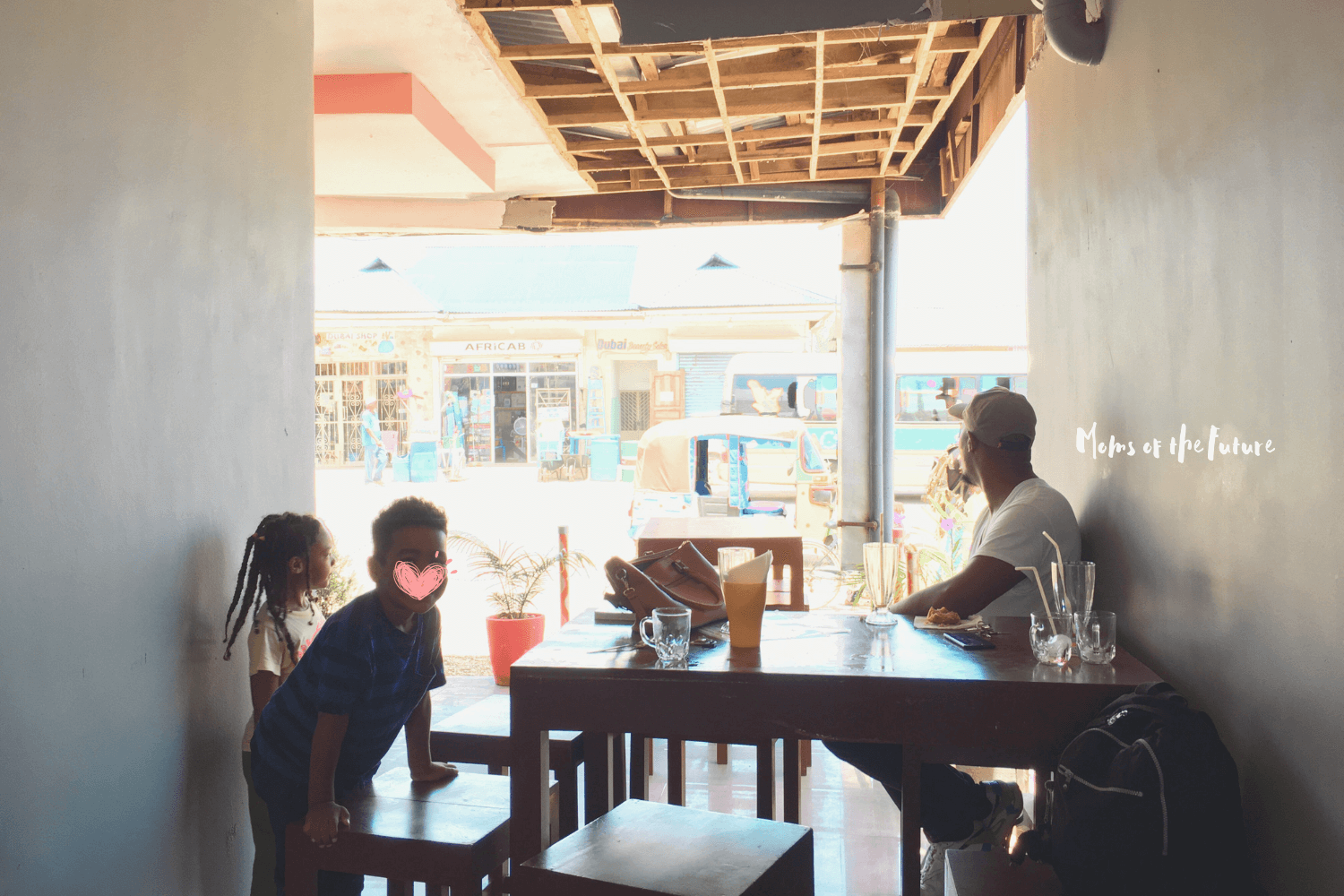
Renting with Airbnbs allows you to have an immersion experience of a country, from living, to shopping to eating out. It is the best way to learn Global Citizens skills.
Children who experience new cultures directly in their most authentic way develop a sense of adaptability and diversity awareness while building true meaningful friendships that transcend language barriers and cultural differences. Those children are the Global Citizens of tomorrow.
Discuss Global Issues and Social Justice
It is always important to remind children to be grateful for their above-average lifestyle. If they wake up with a roof over their head, wear shoes to school, and eat three meals a day, they are luckier than most children in the world including children in their city.
Part of being a Global Citizen comes with an understanding of sensitive issues such as poverty, food insecurities, and access to education and healthcare. I believe that children deserve to know about these issues and they should be explained in an age-appropriate manner so that they can feel that is their responsibility to do something about it.
There are so many creative ways for children to get involved in global issues. They can raise awareness by building online presentations that highlight causes they care about; they can participate in fundraisers; they can volunteer in shelters; they can adopt a pet; they can even plant a seed. All these actions have positive impacts on the planet because they come from a good intention that is beyond the child's immediate needs. It is for the greater good.
What matters is that children have appropriate awareness beyond themselves. We've been made with many different cultures and backgrounds to learn and help one another.
Discussing environmental and social issues helps children want to be more productive, helpful, creative, and engaging members of the local and global community who strive to consciously and effectively participate in making the planet a better place.
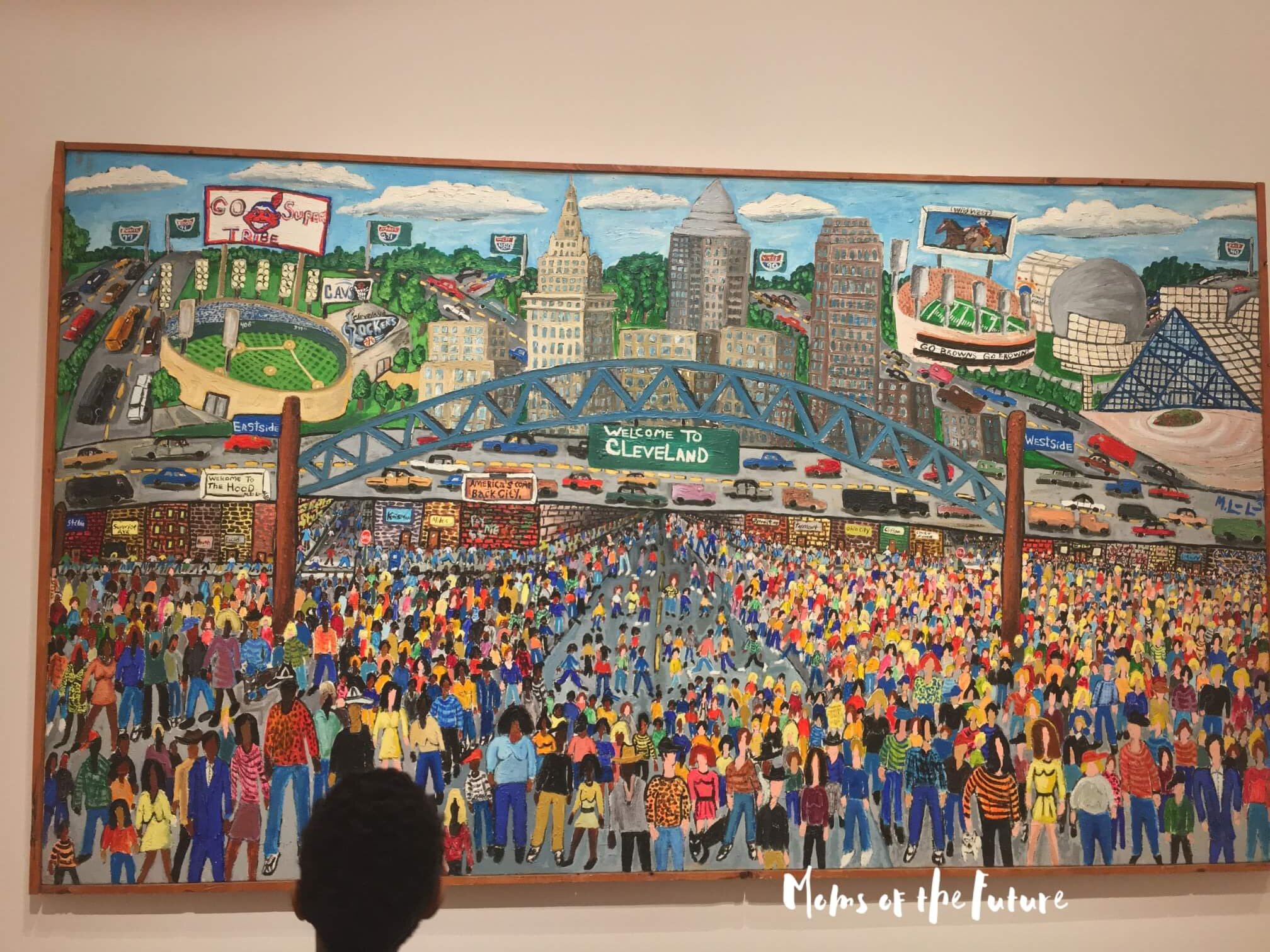
Museums are wonderful places for children to gain new perspectives on certain issues and specific times in history. This particular painting by Cleveland native painter Michelangelo Lovelace showed the racial disparity and segregation present in the city.
Discuss Environmental Challenges
Our children and the upcoming generations will be the inheritors of the environmental challenges our planet is facing.
Living in America, I've realized it is difficult for our children to truly grasp the environmental effects of mass consumption, pollution, and climate change. The streets are clean, there’s food available all year long, and for most of the country, the seasons follow their usual patterns.

It is important to teach children from a young age the importance of recycling, responsible shopping and donating. Our local Eco Fest that raises awareness by environment challenges had a stand of items up for grabs from shoes to printers.
However, when we traveled overseas my children were in for a wake-up call. They experienced a serious drought in Tunisia and could see in the grocery store the effect it had on food availability. At some point, in Tunisia, the grocery store didn't carry sugar, flour, butter, or rice. We didn’t see one day of rain in six months from Spring to Summer.
While in Tanzania, they witnessed their favorite beach swamped with trash overnight. Small pieces of plastic, consumer, and medical trash washed up from the vast ocean, invading the habitat of all the amazing animals that we encountered every day on the beach. It was heartbreaking. My children were outraged. They asked, "Mom where did all this trash come from ?"
They didn’t have to think twice when it came time for the people of Tanzania to come together to clean the beach. My children felt it was their mission, their responsibility to take care of their planet.
This sense of environmentalism has never left them. As soon as they came back to the US. my children became active in the local green community, helping, learning, and attending events whenever they could. They have attended community gardens where they not only planted veggies but also had the awesome privilege of eating them!
It even inspired me to donate my time to a local green organization. We will continue our green mission wherever we go.

Community gardens are great way for children to engage with nature and connect with other kids while learning how to have a positive impact on the planet.
Being a Global Citizen is a Family Journey
Being a global citizen is not a privilege or a skill reserved for the elite. Everyone in the world can be one! Actually, everyone in the world should be one. If you're open to embracing the vastness of the world with all its beauty, diversity and resources while still accepting and understanding its limits, challenges and weaknesses then you're already one.
We as people have powers to change the world. There's no age limit. There's no price tag attached to it. It only requires willpower.
We can do our part by encouraging awareness and action in cause we deeply care about in hopes of making the world a better place. It's a lifetime mission that knows no boundaries and no end.
Global Citizens are the true heroes and we should all strive to be one.
